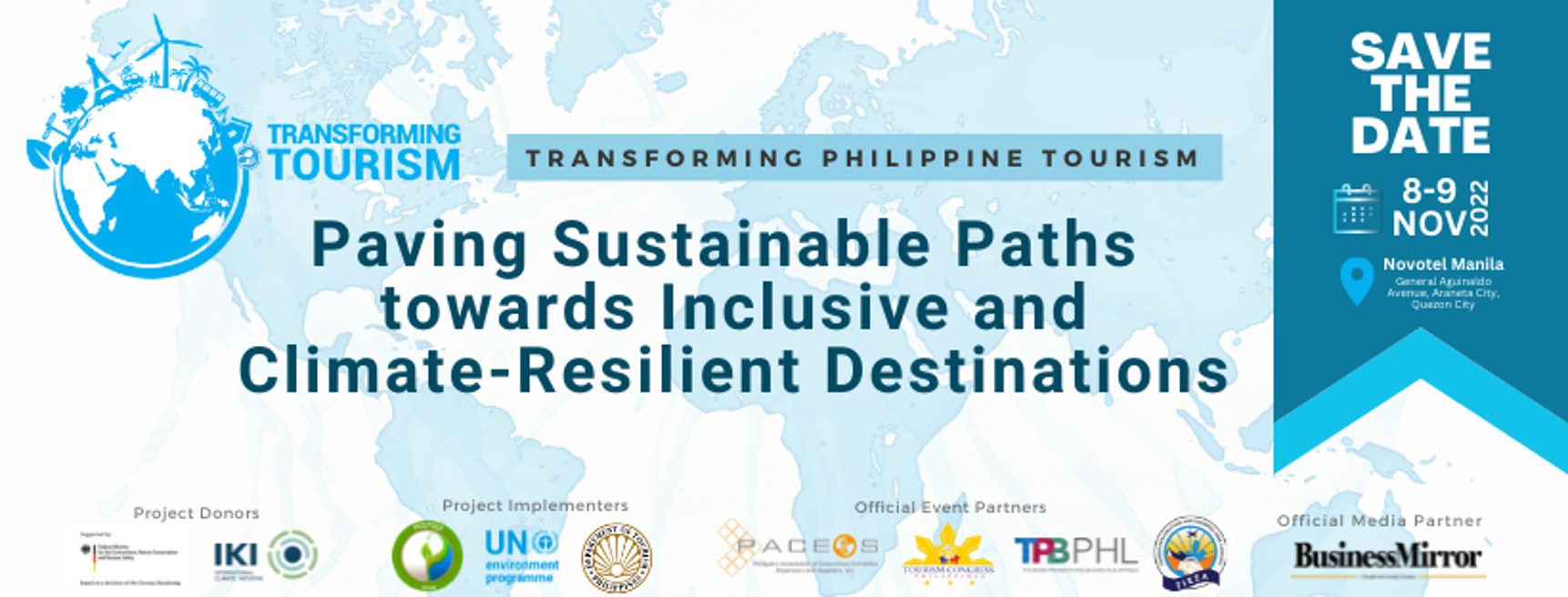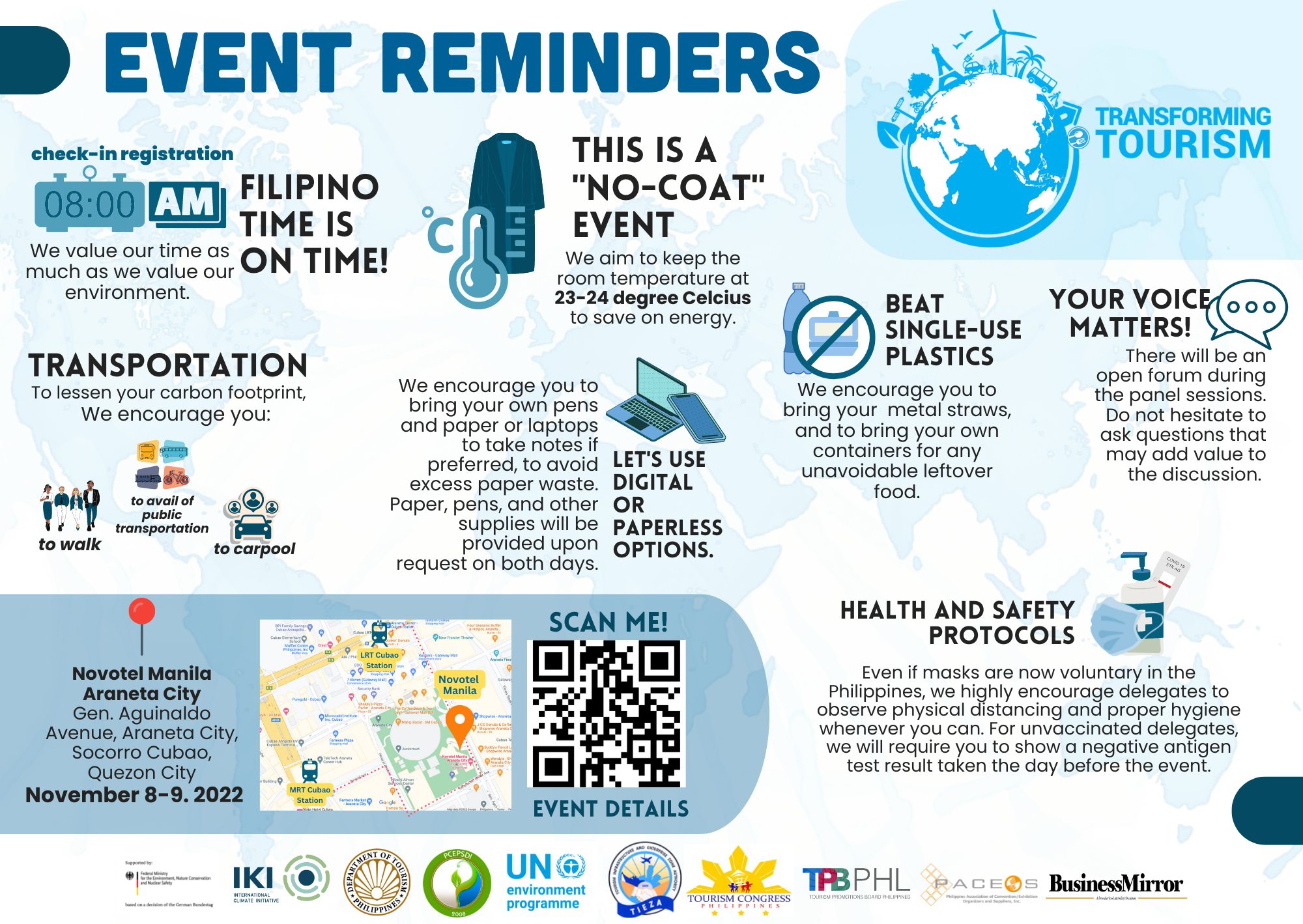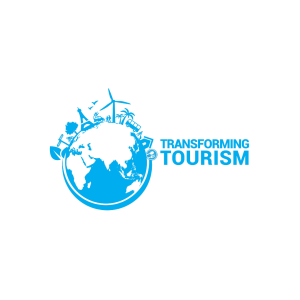
8-9 November 2022 | 2F, Monet Ballroom 3, Novotel Manila, Cubao, Quezon City.
> Back to TVC Philippines Main Page
The United Nations Environment Programme (UNEP) together with the Department of
Tourism (DOT) and the Philippine Center for Environmental Protection and Sustainable
Development, Inc. (PCEPSDI), with the support of the German government as part of the
International Climate Change Initiative program, established the “Transforming Tourism Value
Chains in Developing Countries and SIDS to accelerate more resource efficient, low carbon
development” project in 2017, with the aim of reducing greenhouse gas (GHG) emissions and
increasing resource efficiency in high resource areas, specifically accommodations, meetings,
incentives, conferences and events (MICE), including the cross-cutting food & beverage (F&B)
operations. The project was instituted through the issuance of DOT’s Department Order No.
2017-41 creating the Philippine Stakeholders Advisory Group (PSTAG) for Sustainable
Tourism, consisting of different organizations both from the public and private sectors namely
the Department of Environment and Natural Resources (DENR), Climate Change Commission
(CCC), Tourism Congress of the Philippines, Philippine Hotel Owners Association, Inc.
(PHOAI), Philippine Association of Convention/Exhibition Organizers and Suppliers
(PACEOS), Chamber of Commerce of the Philippine Islands (CCPI), and De La Salle-College
of St. Benilde (DLS-CSB).
After five years of transforming the Philippine tourism industry through capacity building,
research, policy formulation, action implementation, and campaigns towards monitoring and
reducing the carbon footprint of the sector and enhancing its efforts in sustainability, the
Transforming Tourism Value Chains (TVC) project will be hosting its final event with key
tourism stakeholders from the public and private sector to present the project’s
accomplishments and to recognize the achievements of tourism businesses as sustainability
champions.
The event aims to bring together local industry stakeholders to be informed about where
Philippine tourism stands from the lens of sustainable development, to discuss the challenges and opportunities that stakeholders currently face to move forward in sustainable tourism development, and to inspire the sector by recognizing the milestones achieved with the
support of the Transforming Tourism Value Chains project.
In the Philippines, the tourism sector is considered one of the backbones of the country’s
economy. The archipelago boasts of rich natural beauty in its many spectacular beaches,
sunny weather and rich biodiversity. Aside from the rich flora and fauna found in the country,
the Philippines’ unique and complex culture, as exemplified by its people, cuisine and lifestyle,
attracts many people to visit the country, making the tourism sector a key economic and social
development pillar that provides a lot of potential for sustainable growth, employment,
technological innovation and investment, among others. In fact, tourism contribution to the
national GDP amounted to 12.7%, and 13.5% to employment in 2019.
This scale of economic activity has major impacts on the global and local environment, such
as through pollution and waste, depletion of natural resources like water, energy and land as
well as increasing greenhouse gas (GHG) emissions. According to the World Travel and
Tourism Council’s report A Net Zero Roadmap for Travel and Tourism (2021), currently
available estimates of emissions from the travel and tourism sector (pre-pandemic) amount
from 8 to 11% of global GHG emissions, with the accommodations sector contributing at least
6% and the food & beverage sector 9% of this contribution.
The tourism sector is also considered as a victim of the climate crisis, since destinations are
more vulnerable to warmer temperatures, rising sea levels, flooding, forest fires, coral
bleaching, water shortages, biodiversity loss, and marine litter. The pandemic hit the tourism
economy at its core, with restrictions on the movement of people leading to a near-complete
cessation of tourism activity in some tourism destinations in the Philippines. The
consequences for local communities, regions and tourism businesses, 99.51% of which are
MSMEs, have been devastating. These impacts provide an opportunity to rethink tourism
operations and take steps so the measures put in place today can shape a more resilient,
sustainable and inclusive tourism economy for the future.
An international call for green recovery for the tourism sector thus ensued, highlighting better
conservation and sustainable management of our natural tourism destinations such as
beaches, oceans, mountains, parks, and forests, of which the Philippines has, and is seen as
vital to reduce greenhouse gas (GHG) emissions, increase resource efficiency, and embrace
sustainability practices for the transformation of the sector.
Panel 1: Driving Climate Action in Philippine Tourism: Looking at Status and Progress
An Overview of Sustainable Tourism in the Philippines
Ms. Eylla Laire M. Gutierrez, Research Manager, Asian Institute of Management (AIM) – Dr. Andrew L. Tan Center for Tourism
Sustainable Solutions: Greening the Food Service and Tourism Sector
Ms. Brenda Butardo, Programme Officer – Green Choice Philippines, Philippine Center for Environmental Protection and Sustainable Development, Inc. (PCEPSDI)
A Call for Sustainable and Transformative Tourism Destinations: Responding to Climate Urgency
Hon. Raphaelle Veronica Ortega-David*, Provincial Governor, La Union
Philippine Tourism Facing Global Megatrends
Mr. Teddy Monroy, Country Representative, United Nations Industrial Development Organization (UNIDO)
Achievements and Outputs of the Transforming Tourism Value Chains Project
Ms. Andrea Janelle D. Go, Project Officer – Transforming Tourism Value Chains, Philippine Center for Environmental Protection and Sustainable Development (PCEPSDI)
Panel 2: Raising the Bar for Sustainable Tourism in the Philippines: Sustainability Leadership of Private Sector in the Philippines
Communicating and Reporting on Sustainability Progress for Tourism Businesses
Mr. Roderick F. De Castro, Executive Director, Business for Sustainable Development
SMHCC’s Roadmap to Carbon Offsetting
Ms. Alexis Bautista, Sustainability and Quality Manager, SMX Convention Centers (SMXCC)
Travellers International’s I Love Earth Program
Mr. Kingson Sian, President, Travellers International Hotel Group, Inc.
Supporting the Glasgow Declaration
Mr. Karlo Angelo C. Evangelista, Compliance Manager, Savoy Hotel Manila
Supporting the Global Tourism Plastics Initiative
Mr. Kiko Velhagen, Sustainability Officer, Ten Knots Philippines, Inc.
Special Session on Extended Producer Responsibility
Beating Plastic Pollution in the Tourism Industry: A Glimpse into the Extended Producer Responsibility Law
Atty. Ivy Joyce de Pedro, Department of Environment and Natural Resources – Environmental Management Bureau (DENR-EMB)
Panel 3: Mobilizing Sustainable Tourism through Investment Opportunities
Boosting Sustainable Tourism Development through Infrastructure Investment in Key Tourism Destinations
Atty. Karen Mae Sarinas-Baydo, Assistant Chief Operating Officer, TIEZA
Green Financing: Opportunities for Enhancing Tourism Infrastructure
Mr. Prudencio Callado, Vice President, Landbank of the Philippines



